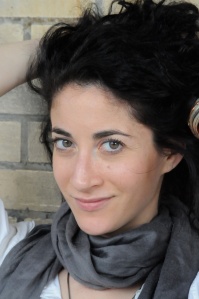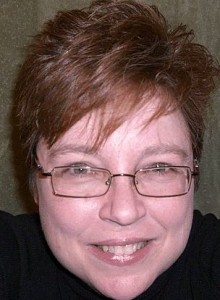If you've been visiting my blog for the past few months, you've probably noticed that the cover of Unearthly has been in my upcoming review widget for quite sometime. I can explain. I hit a really bad streak of reading pretty bad angel related books with gorgeous covers. I began to think that maybe the subject of angels was turning me off so I was hesitate to pick up Unearthly. Reading glowing reviews about the book around the blogosphere made me to decide to give this book a shot. So I moved it from the bottom of my to be read pile to the top and I can honestly say that I glad I did.
 Description: Angels are given a purpose on Earth. Clara Gardner is a Quartarius, a quarter-angel, is about to realize her angel purpose. She is constantly receiving vivid visions of saving a teenage boy from a forest fire in Teton County, Wyoming. Who is this boy? Where is he and why does he need to be saved?
Description: Angels are given a purpose on Earth. Clara Gardner is a Quartarius, a quarter-angel, is about to realize her angel purpose. She is constantly receiving vivid visions of saving a teenage boy from a forest fire in Teton County, Wyoming. Who is this boy? Where is he and why does he need to be saved?
Review: To be completely honest, I had very low expectations for Unearthly. The previous angel novels I read had lots of potential, both plot and character wise, but the writing quickly fell apart. Thankfully, Unearthly made me realize that there are indeed good books about angels. It made me realize that with the previous books, my complaint wasn't necessarily about the subject of the books, but rather how it was written.
The book begins with Clara receiving a vision of saving a teenage boy from a forest fire. The vision clues that Clara remembers such as a license plate lead her family to Jackson Hole, Wyoming. Clara has never seen the boy's face in her vision, only the back of his head and body but on her first day of school, she meets the boy of her vision face to face: the super popular and devastatingly handsome Christian. Clara's sole focus is trying to learn as much about Christian as she can in order to make sense of her purpose. Along the way, she befriends with two very different girls: the easygoing, sweet and adorable Wendy (a character I would love to be best friends with), and Angela, the intense loner. Clara fits nicely with both of these girls, who balance her angel and human characteristics. It's really Wendy’s twin brother, Tucker, though who unknowingly seems to change Clara's purpose and makes her question about blindly following her unknown destiny.
Unearthly does have the usual tropes of a supernatural romance: new girl at a school, two love interests, a secret she can't share, but its Hand's deftly crafted unique angel mythology and interesting characters that held my interest. Though the book is well over 400 pages, I was amazed on how quickly I read it.
Clara is an endearing heroine who is realistically portrayed, well as realistic as you can get in a supernatural romance. She fears not meeting her mother's expectations of her purpose while desiring to find answers about what it means to be an angel. Is she merely a puppet? What happens if she refuses to accept her purpose once she realizes what it is? Or succeeds? Or even worse fails? Clara is also struggling with her feelings for the two love interests. What I loved about Clara is that she is a honest, ordinary girl who actually interacts with her family, which is composed of a single mother who is half angel, and her brother, who is also a quarter angel. Readers are spared the "I can't tell you because it's not safe" routine. Clara does tells the truth to those who are important to her and to those who drive the story.
As for love interests, I'm completely captivated by Tucker Avery. Tuck is someone who exudes natural charm. He is genuinely warm, straight forward, and incredibly funny. I loved how he called Clara "carrots" because it reminded me so much of the banter between Anne Shirley and Gilbert Blythe. Tuck and Clara fit perfectly. Watching these two develop from friendship to a potential relationship was definitely a highlight for me. I didn't mind Christian, the boy of Clara's vision, but I didn't really feel like I got to know him. He is much more reserved than Tucker and I had a hunch that he was also holding back a secret, which isn't revealed until later in the story. I'm sure we will get to know him better in the later installment of this series.
While Unearthly is a trilogy, the ending doesn't leave you with a major cliffhanger. There are enough unresolved questions that will bring readers back for the next book without feeling like we got the carpet pulled out underneath our feet. I'm really curious about Clara's purpose, the information her mother is withholding from her, and of course how a potential love triangle is in the works. I'm glad that I picked up Unearthly and I suggest you should pick it up too if you are in the mood for a relatively clean, sweet romance.
Rating: 4 stars
Words of Caution: There is a very minor scene of underage drinking at a party, but it only lasts for a couple of sentences. Other than that, it's a pretty clean book. Recommended for Grades 7 and up.
If you like this book try: Twilight by Stephenie Meyer, Dark Divine series by Bree Despain, Halo by Alexandra Adornetto, Angelfire by Courtney Allison Moulton
 Description: Angels are given a purpose on Earth. Clara Gardner is a Quartarius, a quarter-angel, is about to realize her angel purpose. She is constantly receiving vivid visions of saving a teenage boy from a forest fire in Teton County, Wyoming. Who is this boy? Where is he and why does he need to be saved?
Description: Angels are given a purpose on Earth. Clara Gardner is a Quartarius, a quarter-angel, is about to realize her angel purpose. She is constantly receiving vivid visions of saving a teenage boy from a forest fire in Teton County, Wyoming. Who is this boy? Where is he and why does he need to be saved? Review: To be completely honest, I had very low expectations for Unearthly. The previous angel novels I read had lots of potential, both plot and character wise, but the writing quickly fell apart. Thankfully, Unearthly made me realize that there are indeed good books about angels. It made me realize that with the previous books, my complaint wasn't necessarily about the subject of the books, but rather how it was written.
The book begins with Clara receiving a vision of saving a teenage boy from a forest fire. The vision clues that Clara remembers such as a license plate lead her family to Jackson Hole, Wyoming. Clara has never seen the boy's face in her vision, only the back of his head and body but on her first day of school, she meets the boy of her vision face to face: the super popular and devastatingly handsome Christian. Clara's sole focus is trying to learn as much about Christian as she can in order to make sense of her purpose. Along the way, she befriends with two very different girls: the easygoing, sweet and adorable Wendy (a character I would love to be best friends with), and Angela, the intense loner. Clara fits nicely with both of these girls, who balance her angel and human characteristics. It's really Wendy’s twin brother, Tucker, though who unknowingly seems to change Clara's purpose and makes her question about blindly following her unknown destiny.
Unearthly does have the usual tropes of a supernatural romance: new girl at a school, two love interests, a secret she can't share, but its Hand's deftly crafted unique angel mythology and interesting characters that held my interest. Though the book is well over 400 pages, I was amazed on how quickly I read it.
Clara is an endearing heroine who is realistically portrayed, well as realistic as you can get in a supernatural romance. She fears not meeting her mother's expectations of her purpose while desiring to find answers about what it means to be an angel. Is she merely a puppet? What happens if she refuses to accept her purpose once she realizes what it is? Or succeeds? Or even worse fails? Clara is also struggling with her feelings for the two love interests. What I loved about Clara is that she is a honest, ordinary girl who actually interacts with her family, which is composed of a single mother who is half angel, and her brother, who is also a quarter angel. Readers are spared the "I can't tell you because it's not safe" routine. Clara does tells the truth to those who are important to her and to those who drive the story.
As for love interests, I'm completely captivated by Tucker Avery. Tuck is someone who exudes natural charm. He is genuinely warm, straight forward, and incredibly funny. I loved how he called Clara "carrots" because it reminded me so much of the banter between Anne Shirley and Gilbert Blythe. Tuck and Clara fit perfectly. Watching these two develop from friendship to a potential relationship was definitely a highlight for me. I didn't mind Christian, the boy of Clara's vision, but I didn't really feel like I got to know him. He is much more reserved than Tucker and I had a hunch that he was also holding back a secret, which isn't revealed until later in the story. I'm sure we will get to know him better in the later installment of this series.
While Unearthly is a trilogy, the ending doesn't leave you with a major cliffhanger. There are enough unresolved questions that will bring readers back for the next book without feeling like we got the carpet pulled out underneath our feet. I'm really curious about Clara's purpose, the information her mother is withholding from her, and of course how a potential love triangle is in the works. I'm glad that I picked up Unearthly and I suggest you should pick it up too if you are in the mood for a relatively clean, sweet romance.
Rating: 4 stars
Words of Caution: There is a very minor scene of underage drinking at a party, but it only lasts for a couple of sentences. Other than that, it's a pretty clean book. Recommended for Grades 7 and up.
If you like this book try: Twilight by Stephenie Meyer, Dark Divine series by Bree Despain, Halo by Alexandra Adornetto, Angelfire by Courtney Allison Moulton
Labels:
100+ Reading Challenge,
4 stars,
Childrens,
Friendship,
Mystery,
Romance,
Supernatural,
Unearthly series,
YA
3
comments
|




























